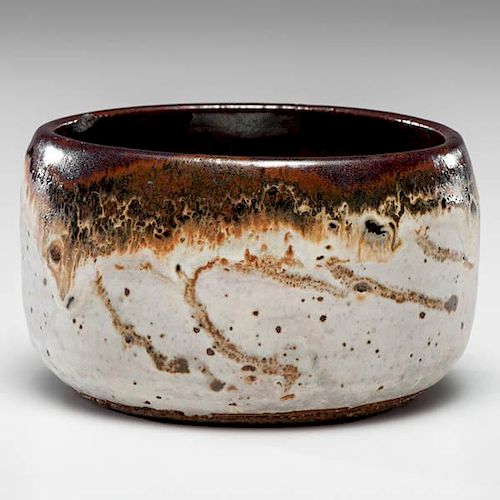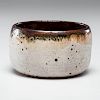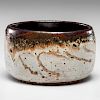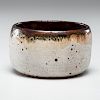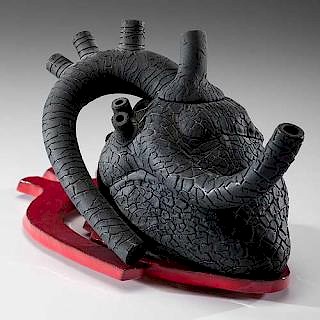Albert Green (1914-1994, USA)
About Seller
6270 Este Ave.
Cincinnati , OH 45232
United States
With offices in Cincinnati, Cleveland and Denver, Cowan’s holds over 40 auctions each year, with annual sales exceeding $16M. We reach buyers around the globe, and take pride in our reputation for integrity, customer service and great results. A full-service house, Cowan’s Auctions specializes in Am...Read more
Two ways to bid:
- Leave a max absentee bid and the platform will bid on your behalf up to your maximum bid during the live auction.
- Bid live during the auction and your bids will be submitted real-time to the auctioneer.
Bid Increments
| Price | Bid Increment |
|---|---|
| $0 | $25 |
| $500 | $50 |
| $1,000 | $100 |
| $2,000 | $250 |
| $5,000 | $500 |
| $10,000 | $1,000 |
| $20,000 | $2,500 |
| $50,000 | $5,000 |
| $100,000 | $10,000 |
About Auction
Oct 23, 2015 - Oct 24, 2015
Cowan's Auctions dawnie@cowans.com
- Lot Description
Tea Bowl
ca 1954
Glazed Stoneware; ht. 3.25, dia. 5.25 in.
'54 slip signed on base.
Green was born in 1914 into a working class family. Driven by a fierce work ethic he was able to enter the University of Pennsylvania at the age of 16 on a full scholarship for both his academic and athletic achievements. He was a champion middle distance runner throughout college.
He studied painting at the Art Students League in New York City. But in 1946 a chance encounter, a rare one at that time, saw a display of contemporary Japanese pottery by the Mingei master Shoji Hamada that changed his life. On the spot he decided to switch from painter to potter.
Green was born in 1914 into a working class family. Driven by a fierce work ethic he was able to enter the University of Pennsylvania at the age of 16 on a full scholarship for both his academic and athletic achievements. He was a champion middle distance runner throughout college.
He studied painting at the Art Students League in New York City. But in 1946 a chance encounter, a rare one at that time, saw a display of contemporary Japanese pottery by the Mingei master Shoji Hamada that changed his life. On the spot he decided to switch from painter to potter.
Green did not go to any ceramic schools such as Alfred University but learned pottery techniques through the rather daunting, method of ceramic engineering manuals and his knowledge of college chemistry taught himself glaze technology.
Then he merged this with his painting skills and produced a translation of Japanese style pottery decoration that was thoroughly Western and unique within this widespread Japonisme treatment in America. This use of color was striking and bold and felt connected to mid-century modernism just as it was breaking through into American culture, with geometric panels of bright color and powerful slip drawing.
Whereas the Mingei style presented reticence, Green delivered bravado. Now that mid-century is so significant, collected as style artifacts and design trophies, and also influencing the new, Green’s pottery is finding a new life and appreciation for its zest, adventurous color and complex compositions all anchored in sturdy, handsome vessel forms.
Green had numerous awards for his art from the Cooper-Hewitt Museum and National Museum of Design in New York and was made a Fellow of the American Craft Council. He is in the collection of the Chicago Art Institute; High Museum of Art, Atlanta; Los Angeles County Museum of Art, Los Angeles; Everson Museum of Art, Syracuse, NY; Renwick Gallery of the National Museum of American Art, Smithsonian Institution, Washington, DC and Museum of Fine Arts, Boston, MA.
Provenance: Directly from the Family of the Artist1/2 inch chip on interior of lip.Condition
- Shipping Info
-
SHIPPING. At the request of the buyer, Cowan's will authorize the shipment of purchased items. Shipments usually occur within two weeks after payment has been received. Shipment is generally made via UPS Ground service. Unless buyer gives special instructions, the shipping method shall be at the sole discretion of Cowan's Auctions, Inc.. Cowan's is in no way responsible for the acts or omissions of independent handlers, packers or shippers of purchased items or for any loss, damage or delay from the packing or shipping of any property.
Cowan's recommends the following local shippers to handle purchases:
The Neighborhood Office8440 East Washington StreetChagrin Falls, Ohio 44023Phone: 440-708-0101
Fax: 440-708-0102
UPS store
-
- Buyer's Premium



 EUR
EUR CAD
CAD AUD
AUD GBP
GBP MXN
MXN HKD
HKD CNY
CNY MYR
MYR SEK
SEK SGD
SGD CHF
CHF THB
THB